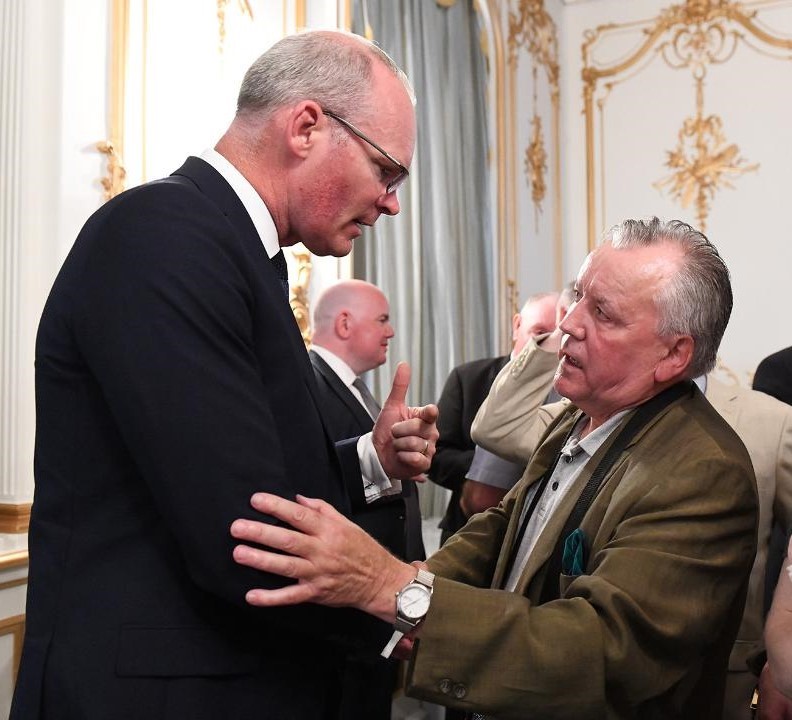Simon Coveney TD stands by his commitment to extending the vote for the presidential election in Ireland to the Irish Abroad. The Irish Post’s GERRY MOLUMBY was in Wexford to hear Simon Coveney TD speak on the subject
 EMBASSY MEETING The then Minister for Foreign Affairs Simon Coveney (left) pictured with Gerry Molumby (Irish Embassy London 2022 image courtesy of Malcom McNally Photography)
EMBASSY MEETING The then Minister for Foreign Affairs Simon Coveney (left) pictured with Gerry Molumby (Irish Embassy London 2022 image courtesy of Malcom McNally Photography)AT this summer's Kennedy Summer School in New Ross, the former Tánaiste Simon Coveney TD predicted that up to three million Irish citizens living outside of the State, including Northern Ireland, would “respond very well” to voting in presidential elections.
He added: “I think it’s important to be honest. I think there are a lot of senior politicians who shy away from this decision because of political reasons.”
Brave words for an existing politician; but he is right.
He dealt head-on with the myth — and indeed the fear — that by extending the franchise to the Irish Abroad the potential for a Sinn Féin president at Áras an Uachtaráin would increase. Mr Coveney said that there were "very valid questions around qualification criteria to be on the voter register".
Nonetheless, the fear of an outsized benefit for Sinn Féin should not be allowed to impact people's thinking on the matter. “Many Irish people in Northern Ireland see themselves as Irish as I am," he said. "They have the same stake in their own minds in the future of Ireland as we have." He added that quite properly those people "should be part of choosing Ireland’s first citizen".
The established political parties in the Republic continue to be reluctant to extend any franchise to the Irish Abroad, but when visiting the Diaspora are all ‘up for it’ and wax lyrically on the positivity of extending the vote to the Irish Abroad — that is Irish citizens living outside the Republic.
This indecisiveness has resulted in a tactic of basically kicking of the can well down the streets of Ireland.
It is a myth that all of the 70-plus millions of global people of Irish descent could, or would, vote in an election held in Ireland — one of the oft-quoted fears is that a Diaspora vote might swamp a domestic vote. Irish citizenship for those born outside the State, or not resident in the State, entails a lengthy process.
To stand for the presidency of Ireland you must be an Irish citizen, and be nominated either by at least 20 members of the Oireachtas, or at least 4 local authorities.
This is to prevent the usurping of the process by a maverick candidate. So the scenario of a maverick president backed by a block of maverick voters in the Diaspora is rubbish.
But reluctance still remains in the governing circles to grant this advance in democracy.
Over the past fifteen years I have read every major Irish political party general election manifesto of candidates wanting to serve in the Oireachtas. The have almost universally declared support for extending the franchise in presidential elections, and some even widening that to ‘reserved constituencies’ representing Irish citizens on a pro rata continent representation. But little changes.
In 2013 a constitutional convention (now known as Citizen Assemblies) recommended extending votes to citizens living outside of the Republic of Ireland for the presidency — a position officially supported by all of the largest political parties in the State since.
In 2014, the Oireachtas joint committee on European Union (EU) affairs considered a European Commission communication on "recommending that Irish citizens abroad should have the right to vote in Dáil elections”.
The extension of the franchise to vote in presidential elections would have to be carried in a referendum in the Republic.
The proposal would allow those of the 1.9m people living in Northern Ireland who declare themselves as Irish, and those living elsewhere outside the State but holding an Irish passport, a right to vote in presidential elections only.
Mr Coveney finished on a positive note in New Ross. He said extending the vote “would greatly help in knitting together what it means to be the Irish worldwide – a relationship that is “a two-way street”. I agree with that and would add: the Irish president acts as a unifying head of the Irish nation at home and abroad. Although with limited executive powers, they represent Ireland internationally.
Since the election of Mary Robinson who defined the presidency as global, the office maintains firm cultural and business links with the Diaspora; so the relevance of allowing citizens abroad a vote is quite clear.
Ireland will gain much by fully cherishing its “exiled children”, whether in America as cited in the 1916 Proclamation, or here in Britain — and all stops to Australia.
Encouraging Irish people to reconnect with their country not only makes emotional sense; it makes good business sense for Ireland in having a large, English-speaking, successful Diaspora invested in Irish affairs. It is an asset of which many other small nations could only dream of.
That two-way bond would be enhanced by allowing Irish people abroad to vote for the head of State.
For me personally, it may be too late, because if the next president serves two terms, I will be 85.
I have witnessed and commented on the history and the delaying tactics by various Irish government coalitions — from Enda Kenny’s declaration of the principle in Philadelphia in 2017 to the exclusion of the global Irish in the next year’s presidential election 2024. Simon Coveney is about to exit Irish politics but it is good to hear him make a historic commitment to further the votes for Irish abroad even if he was one of the ‘lads’ who kicked proverbial can down the road.

